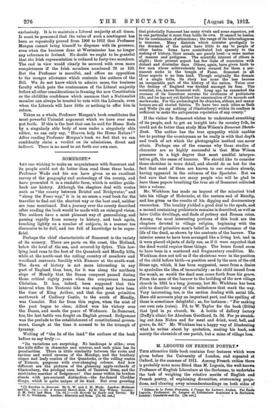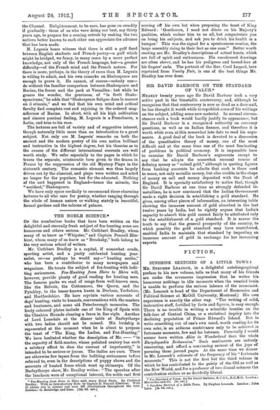M. LEGOUIS ON FRENCH POETRY.*
THIS attractive little book contains four lectures which were given before the University of London, and repeated at Oxford, in the summer of 1911. Among French critics there is probably none more fitted than M. Legouis, the well-known Professor of English Literature at the Sorbonne, to undertake the task of weighing the relative merits of English and French poetry, of explaining diversities, overcoming preju- dices, and clearing away misunderstandings on both sides of • Defense de in Fazio Frangaise, d Pusage des Leasure Anglais. Par Emile Legouis, Professeur de Langue et Littdrature Anglaises a in Sorbonne. London Constable and Co. [Se. net.]
the Channel. Enlightenment, to be sure, has gone on steadily if gradually : those of us who were doing our hest, say thirty years ago, to prepare for a coming entente by making the two nations better known to each other can appreciate the advance that has been made.
M. Legouis bears witness that there is still a gulf fixed between English students and French poetry—a gulf which might be bridged, we fancy, in many cases by a more perfect knowledge, not only of the French Language, but—a greater difficulty—of the French mind and the French nature. For there is more, perhaps, in the theory of races than M. Legouis is willing to admit, and his own remarks on Shakespeare are enough to prove it. He cannot, of course—nobody can— do without the familiar comparison between Shakespeare and Racine, the forest and the park at Versailles : but while he grants the wonder, the greatness, of "la foret Shake- spearienne," he adds that "Shakespeare fatigue dana la mesure on it stimule," and we feel that his own mind and critical faculty find complete rest and rejoicing in the ordered mag- nificence of Racine. In short, with all his high cultivation and sincere poetical feeling, M. Legouis is a Frenchman, a Latin, and true to his race.
The lectures are full of variety and of suggestive interest, though naturally little more than an introduction to a great subject. Not only are M. Legouis' remarks on both the ancient and the modern poetry of his own nation brilliant and instructive in the highest degree, but his theories as to the causes of the different international currents are well worth study. We refer especially to the pages in which he traces the separate, aristocratic turn given to the drama in France by the suppression of the old Mystery Plays in the sixteenth century. The romantic element was thus largely driven out by the classical, and plays were written and acted no longer for the populace, but for the educated. Nothing of the sort happened in England—hence the miracle, the " accident," Shakespeare.
We have only space cordially to recommend these charming lectures to all who care for poetry, whether ranging through the whole of human nature or walking stately in beautiful, formal gardens and the saloons of palaces.



































 Previous page
Previous page